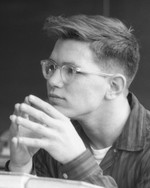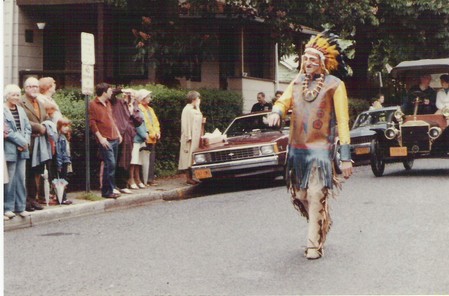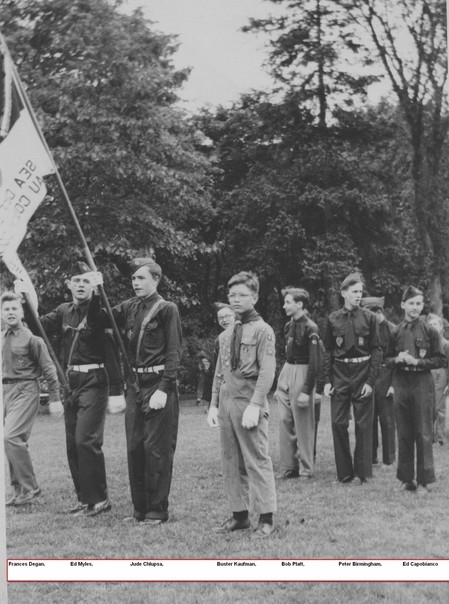Sea Cliff High School
Classes of 1925 -1970
User Forums
| Forum: News From The Past | |||||
|
|||||
|
Wallace Kaufman
Class Of '57
 Joined: 04/25/09 Posts: 97 View Profile |
Village on Parade: Memorial Day Posted Tuesday, April 27, 2010 08:18 PM
Photo of Charles "Charlie" Augustus Hicks by Carol Vesicchio Griffin
ON PARADE: MEMORIAL DAY
Almost every community has a directory. They used to be printed. Today they are on the Internet along with community web pages. Sea Cliff has one: http://www.seacliff-ny.gov/ (Glenwood and Glen Head apparently do not.) Missing from Sea Cliff’s “Recreation and Events” page is the greatest community event of our time—the Memorial Day Parade. The Parade was a living, walking, singing, drumming, flag waving, gun shooting, praying directory of the village population and interests. After a few years as spectator and one of the kids scrambling to pick up the shells ejected after the salutes to veterans, I marched in the Parade for several years as a Boy Scout. I would rather have been watching. Instead my parents watched. Each year I had a few more merit badges on my sash, but we never had enough money for the full official uniform. I had to wear the same khaki pants from year to year. Even I, always a sartorial ignoramus, knew my pants were embarrassingly too short. Betty Sprague captures both the community and the event in her recollection. From Betty Sprague (Harnage): Memorial Day. I am 7, maybe 8 I have dressed in my brown skirt and blouse with Troop _______ on the shoulder patch. I will march with the Brownie Scouts in the day’s parade. My house is two blocks from the overgrown cemetery next to the school yard. A few dozen gray stones hold names of no one I ever heard of, people named Lugar and Carpenter, Lugar, and I don’t go in there among the tall grasses, the blackberry canes, and wild shrubs. Years later, when I started working nights at Dobkins, that cemetery was between me and home. No matter which way I went, I had to pass that darned cemetery. Usually I would run as fast as I could, crinoline swishing - probably making way too much noise for all the ghosts and goblins that might have been hiding there (Charlie Hicks comes to mind, bless his soul). Until recently, I would dream of actually running so fast, my feet barely touched the ground. So I guess that cemetery affected my subconscious for a long, long time. But for me that’s where the Memorial Day and the parade starts. I watch and a color guard of men in American Legion hats arrives and passes into the cemetery. I listen absolutely still. In the cool May morning with the sun still slanting into the tall unpruned privet around the cemetery the long slow notes of a bugle begin to rise, make their statement and fade. This is “Taps” and it is played for some of the people in the cemetery, “the fallen.” When the color guard marches out, the parade begins for me and for everyone in Sea Cliff. The parade, at least for that day is Sea Cliff. It is a half mile of Brownies, Cubs, Boy Scouts and Girl Scouts, firehouse band and school band, fire trucks, veterans, and women’s auxiliary. And it is the long gangly tall tan colored Charlie Hicks with his lantern jaw and joyous smile and waving arms who dresses like an Indian and calls himself the firehouse mascot. The living will stop again at the chest high stone in Memorial Park and the names of the fallen from World War II, and one last time when the town assembles in Clifton Park in front of the great stone and its big bronze plaque and the names of the fallen. Someone will talk about the fallen. The Legionaire color guard will raise their rifles. “Ready, aim, fire!” and the guns sound at once. Then again, and again. Then as the smoke drifts away and boys scramble for the long copper shell casings the bugle sounds one last time. No one in the crowd of hundreds of people says a word. I know the words of Taps. I say them in my head, ‘Gone the sun, from the hills, from the lakes, from the skies. Day is done. Safely rest.”
Photo from Nik Epanchin
|
||||
|
|||||


